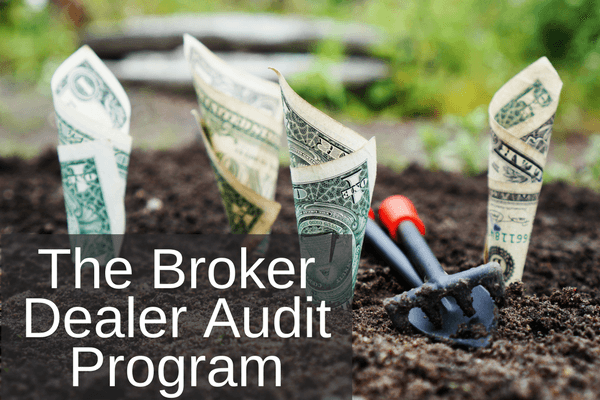The purpose of performing broker dealer audits and requiring regular reporting is to verify that broker dealers are compliant with regulations intended to protect investors. The broker should implement consistent internal investigations to assure this goal, but audits are the primary tool used by … Read More
Experienced Auditors
Experienced auditors are the linchpin of a robust financial assurance process, bringing a wealth of knowledge and skill to the table. In a landscape where financial scrutiny is paramount, their expertise becomes instrumental in ensuring accuracy, transparency, and compliance.
The depth of experience that seasoned auditors bring is invaluable. Having navigated diverse industries and intricate financial structures, they possess a nuanced understanding of the complexities inherent in audits. This breadth of experience allows them to approach each engagement with a strategic mindset, tailoring their approach to the unique challenges and nuances of the specific organization.
One of the key advantages of experienced auditors lies in their ability to foresee potential issues and proactively address them. Their seasoned judgment and analytical skills enable them to identify risks, assess controls, and provide insights that go beyond routine compliance. This proactive stance not only minimizes the risk of financial discrepancies but also contributes to operational efficiency and long-term financial health.
Communication is another hallmark of experienced auditors. They excel in translating complex financial information into clear and actionable insights. This proficiency in communication fosters a collaborative environment between auditors and the organization being audited, ensuring that both parties are on the same page regarding expectations, findings, and recommendations.
Furthermore, experienced auditors stay abreast of the latest industry trends, regulatory changes, and emerging technologies. This commitment to continuous learning positions them as strategic partners, capable of providing forward-looking advice that goes beyond the immediate audit engagement.
In essence, the role of experienced auditors extends beyond the traditional scope of compliance. They are strategic advisors, leveraging their wealth of knowledge to not only validate financial information but also to contribute to the overall success and resilience of the organizations they serve. In a landscape where financial accountability is non-negotiable, the value of experienced auditors becomes a cornerstone for organizations aiming for excellence and trust in their financial practices.
How to prepare for your annual broker dealer audit
Preparing for your annual broker-dealer audit should be a proactive agenda throughout your company’s fiscal year. Early preparation allows your business to stay compliant with the numerous rules and regulations. Failure to implement preemptive measures may result in an interruption of your … Read More
Deciphering the Many Motivations Behind Charitable Giving
The motivations behind American giving have been as varied as they are opaque. From various financial motivations to individual, social, or community level motivations, understanding what motivates donors and how these vary across demographic groups can help your non-profit more effectively reach … Read More
Transitioning your Non-Profit from Overhead to Impact
Local and national watchdog groups have played an important role in helping donors identify questionable non-profits for decades. However, the measurement standards have evolved since groups such as GuideStar, Charity Navigator, and the Better Business Bureau’s Wise Giving Alliance began issuing … Read More
Leveraging Accountability to Grow your Non-Profit
Your non-profit’s mission is the core of your organization, and it is imperative that not only does your organization make an impact, but that it does so effectively and that the broader community understands this impact. Accountability allows for the work your non-profit does day in and day out to … Read More
Why Accounting Methods Create Differences in your Financial Statements
Your organization likely develops financial statements internally throughout the years for your Board of Directors. This might include reports every month, quarter, or another cycle that your board prefers. Then, at year end, your auditors always propose adjustments. Why the consistent … Read More
How to Determine the Value of Donated Items for you Non-Profit
It can be difficult for non-profit organizations to value non-cash and in-kind donations. There are several purposes for valuing donations including record-keeping or providing a value for charitable tax deduction. Either way, your non-profit’s tax needs will likely include valuing donations at … Read More
How to know if your Non-Profit’s Special Event should be Repeated Next Year
Non-profits use special events to raise large amounts in a short period of time. Most often, the donor receives a direct benefit from the event — such as dinner or participation in a gaming activity. But special events don’t always meet their fundraising goals. In fact, organizations can lose money … Read More
Considering Whether to Compensate your Non-Profit’s Board Members
Non-profit board members are legally able to be compensated, and sometimes it might even be necessary. But is it right for your organization? Strengthen Governance: Empower Non-Profit's Board Members. Explore insights for effective leadership, collaboration, and mission-driven success. Pro and cons … Read More
Analyzing Revenue like an Auditor can help Non-Profits Optimize Fundraising
Auditors are specialists in understanding how revenue is generated and allocated. They will spend a lot of time analyzing revenue figures, reviewing the methods used to record revenues, and performing a detailed income analysis. Non-profits can learn from auditing techniques to improve their … Read More









